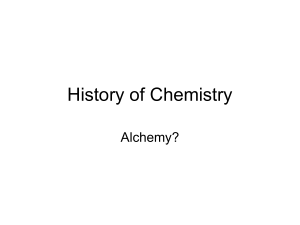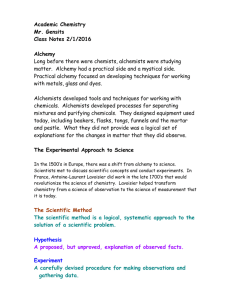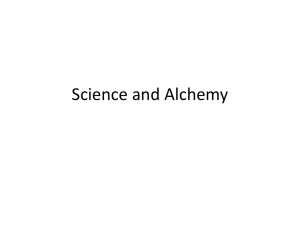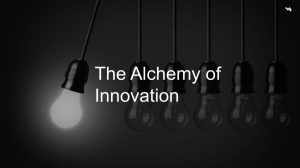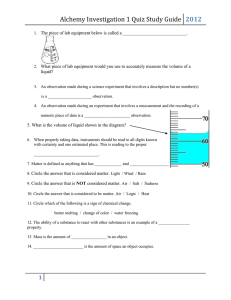Integral Alchemy: Inner Transformation & Spiritual Growth
advertisement
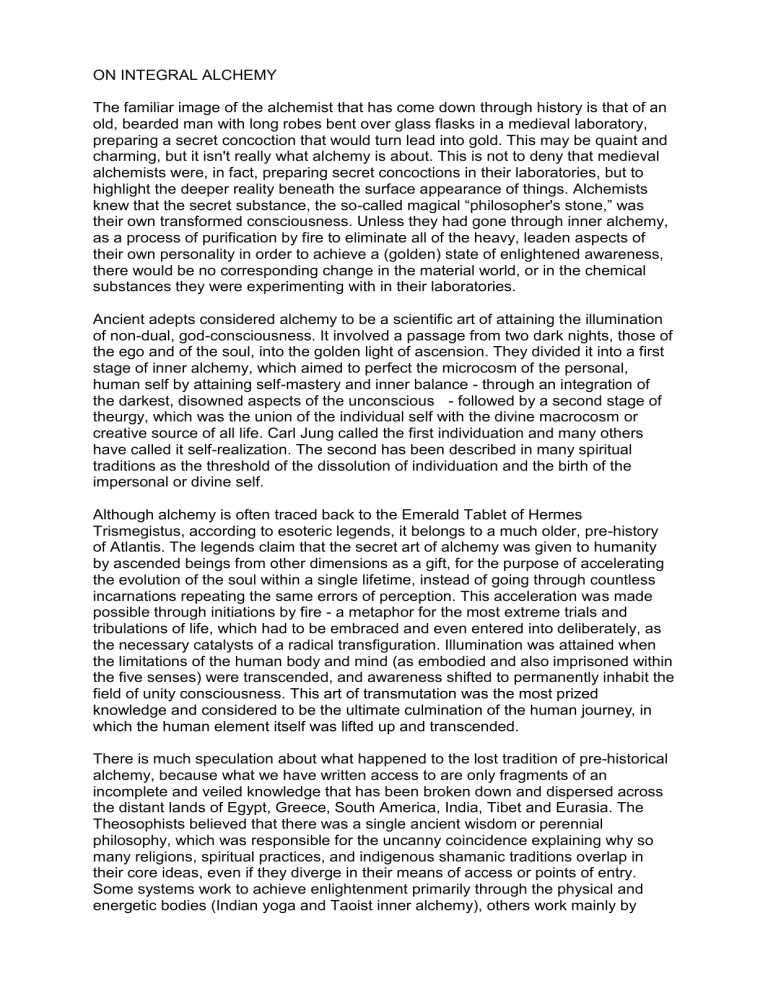
ON INTEGRAL ALCHEMY The familiar image of the alchemist that has come down through history is that of an old, bearded man with long robes bent over glass flasks in a medieval laboratory, preparing a secret concoction that would turn lead into gold. This may be quaint and charming, but it isn't really what alchemy is about. This is not to deny that medieval alchemists were, in fact, preparing secret concoctions in their laboratories, but to highlight the deeper reality beneath the surface appearance of things. Alchemists knew that the secret substance, the so-called magical “philosopher's stone,” was their own transformed consciousness. Unless they had gone through inner alchemy, as a process of purification by fire to eliminate all of the heavy, leaden aspects of their own personality in order to achieve a (golden) state of enlightened awareness, there would be no corresponding change in the material world, or in the chemical substances they were experimenting with in their laboratories. Ancient adepts considered alchemy to be a scientific art of attaining the illumination of non-dual, god-consciousness. It involved a passage from two dark nights, those of the ego and of the soul, into the golden light of ascension. They divided it into a first stage of inner alchemy, which aimed to perfect the microcosm of the personal, human self by attaining self-mastery and inner balance - through an integration of the darkest, disowned aspects of the unconscious - followed by a second stage of theurgy, which was the union of the individual self with the divine macrocosm or creative source of all life. Carl Jung called the first individuation and many others have called it self-realization. The second has been described in many spiritual traditions as the threshold of the dissolution of individuation and the birth of the impersonal or divine self. Although alchemy is often traced back to the Emerald Tablet of Hermes Trismegistus, according to esoteric legends, it belongs to a much older, pre-history of Atlantis. The legends claim that the secret art of alchemy was given to humanity by ascended beings from other dimensions as a gift, for the purpose of accelerating the evolution of the soul within a single lifetime, instead of going through countless incarnations repeating the same errors of perception. This acceleration was made possible through initiations by fire - a metaphor for the most extreme trials and tribulations of life, which had to be embraced and even entered into deliberately, as the necessary catalysts of a radical transfiguration. Illumination was attained when the limitations of the human body and mind (as embodied and also imprisoned within the five senses) were transcended, and awareness shifted to permanently inhabit the field of unity consciousness. This art of transmutation was the most prized knowledge and considered to be the ultimate culmination of the human journey, in which the human element itself was lifted up and transcended. There is much speculation about what happened to the lost tradition of pre-historical alchemy, because what we have written access to are only fragments of an incomplete and veiled knowledge that has been broken down and dispersed across the distant lands of Egypt, Greece, South America, India, Tibet and Eurasia. The Theosophists believed that there was a single ancient wisdom or perennial philosophy, which was responsible for the uncanny coincidence explaining why so many religions, spiritual practices, and indigenous shamanic traditions overlap in their core ideas, even if they diverge in their means of access or points of entry. Some systems work to achieve enlightenment primarily through the physical and energetic bodies (Indian yoga and Taoist inner alchemy), others work mainly by cultivating the mental/causal body and strengthening concentration (Buddhist meditation, Gurdjieff fourth way practices), and others still by developing the power of inner vision and the capacity to navigate astral dimensions (Egyptian & Greek mystery schools and shamanic traditions). In our contemporary context, which resembles a crowded, noisy marketplace of spiritual commodities, the term “alchemy” has become a cool branding slogan that suggests something otherworldly and magical, but which, in fact, has little to do with the true meaning of the term. This is a polite way of saying that the majority of new-agey, spiritual offerings that brand themselves as alchemy - sound alchemy, alchemy of breath, twin flame alchemy, or alchemy of the dancing warriors, etc - may certainly be interesting and entertaining stuff, but from the point of view of the alchemist, they are something of a bullshit. Alchemy is not an adjective that can be added onto a preexisting toolbox of techniques (like sound healing or breathwork or trance dance); it’s a unified system of transformation with its own metaphysics and corresponding methodologies. Any practice that genuinely identifies itself as “alchemy” - in its original, esoteric sense - must embody these essential principles: (1) The main axiom of alchemy is that there exists a single, common, energetic substance (whatever it may be called - prana, chi, akasha, quintessence), which permeates all things in existence, beyond the surface duality. And this underlying oneness is what allows the transmutation from the lowest to the highest metaphorically, from lead into gold. (2) This oneness expresses itself through a system of correspondences from the heavenly, planetary bodies to the human body and even into the smallest rock. The most famous maxim from the Emerald Tablet expressing this correspondence is “as above so below.” The macrocosm-microcosm relationship can be seen as a metaphor for the universe mirroring in the individual self, but on another level “as above so below” also highlights that the correspondence is one between spirit and matter. Consciousness become projected into and mirrored in the physical world. (3) The ultimate aim of alchemy is achieving union with the fundamental oneness or divine source of creation. This does not mean simply having conceptual knowledge of it, or attaining brief, peak experiences of feeling oneness with all things and then lapsing back into a mundane perception of separation. It means embodying this union in the ordinary moments of daily life. (4) Before becoming an expression of the divine perfection of the macrocosm, the alchemist needs to perfect the individual self (the microcosm) by integrating all the fragmented parts of the personality and its contradictory desires, so there is no longer any inner conflict or resistance. This overhaul requires a first stage of de-conditioning from the attitudes, limiting beliefs and habits of behavior that have been inherited from one’s environment and culture, which gives rise to a second process of uncovering the true, impersonal self beyond the constructed personality. (5) In the process of alchemical transformation nothing is rejected as bad or undesirable because on the deepest level there is no duality of good and evil, or light and dark. An important aspect of inner alchemy is the so-called darker or negative emotions like hatred, anger, shame, fear and absolute terror, which have to be entered into fully in order to become transformed into their underlying, positive desire. These “dark” aspects of the self are transmuted not by resisting them or fighting against them, but by embracing them and discovering what their hidden gifts or inner gold is. In psychological terms, this is a transformation of the primal wounds - both of the personal self (inner child), and of the transpersonal field of collective karma. It is in this sense that entering willingly into negative peak experiences (called nigredo by archaic writers) constituted the secret art of alchemy. To make this last point more concrete and more graphic, for those of you familiar with Alejandro Jodorowsky’s film “Holy Mountain,” the alchemist is an adept who knows how to transform shit into gold. The alchemist is not a light-worker (in the sense of singing a merry song of positive thinking and joyful emotions) ... but a shadow-worker, for who the prima materia, or the starting point of the spiritual journey of enlightenment, is all the despised shit that inhabits the personal and collective unconscious. Through practice, the shadow-worker becomes a master of equanimity who can embrace love, bliss and joy as well as disturbance, turmoil, conflict, dread, and even psychosis - or the whole pendulum swing of life’s contradictory experience - as the most precious teachers on the path of illumination. Our deepest wounds, griefs, and neuroses are not accidents or misfortunate errors, but the necessary elements for creating the alchemical gold. The highest is to be found by diving deeply into the lowest. Alchemy is a path of spiritual acceleration. Transmutation between radically dissimilar substances is a fact of nature - coal transforms into diamonds, but it takes eons to achieve. What the alchemists seek, through their laboratory experiments as a metaphor for tinkering with their own consciousness (and not only), is a shift of velocity that goes from 0 to 100 in an instant. And this acceleration is achieved by embracing whatever is disowned, despised, and difficult to love. In his autobiography, Lester Levenson (a relatively unknown non-duality teacher who influenced David Hawkins’ work) tells the story of his journey from rock-bottom to enlightenment, which took place within 3 months after being diagnosed with a terminal illness. He resolved to throw out everything he had learned and to start from zero, and discovered that the secret to accelerating the frequency scale to reach the highest bliss and peace in the shortest time was feeling love not for the people who it was easy to appreciate, but for the most despicable cads, and the horrible abusers who had wounded him. And that to get there he had to first make peace with his own disgust and hatred, allowing it simply to be and to reach its peak as an energy, after which it deflated and shifted naturally into a warm tenderness. Anyone who has worked with psychedelic plants knows that the deeper the plunge into the despised shit is, the higher the climb into bliss will be. The path of spiritual acceleration is a frequency game. And this game is played by learning how to navigate feeling-states, and transform fear into courage, hate into love, and agitation and turmoil into peace. The transformation is sparked by nor attempting to escape the dissonance and discomfort, but riding through it, like a rollercoaster. Feeling-states are not emotions, which are learned adaptations, but the raw dance of energy pulsations in their nonverbal, nonconceptual dimension. It is the dominant feeling-state that we are in habitually on a daily basis (which Hawkins called, somewhat imprecisely, the “level of consciousness”) that determines the contours of our external reality. That is why someone can verbalize affirmations (as words that correspond to ideas) repeatedly, all day long, and they will not work to shift anything.The words themselves are meaningless. As the hippies knew, it is the “vibe” behind the words that reflects their underlying reality and what is projected into the world. I have chosen the term "Integral Alchemy" to describe my own system of practices, which have evolved mainly through gnosis, as a direct form of inner knowing (or cosmic download) received in “non-ordinary states of consciousness”. That expression is a misnomer, since our “ordinary” state of consciousness is something very unnatural to who we are - it represents a consensus trance in which our attention is captured, hijacked and hypnotized by a dominant ideology that seeks to cast a veil over our perception to keep us powerless and disconnected from ourselves and from each other. And it is in the so-called non-ordinary states that we are centered in the heart and in our inner vision, and have regained our lucidity, clarity and sovereign power. The more we access those non-ordinary states through meditation, breathwork and visionary journeys, the more they become habitual (and ordinary) feeling-states that we can inhabit with eyes fully open, while engaging with the world. The adjective “integral” in Integral Alchemy doesn’t point to anything special; it is a common word that means whole, complete and unadulterated (like integral bread) … and it is also the root of integrity and integration. But I also chose the word integral because it evokes an association with Ken Wilber's "Integral Theory,” which is a project to subsume diverse theories into a single framework that encompasses the "totality of matter, body, mind, soul, and spirit". Integral alchemy, however, is not a theory or philosophy; it is a concrete practice that is focused on the "how to" of transmutation - on the laboratory, experimental work of transforming the prima materia of the human being in all its dimensions, in order to achieve integration. Integral suggests the attempt to unite what has been dispersed in the different psycho-spiritual traditions, and to engage all levels simultaneously – the physical body, the energetic dimension of the chakras, the practice of centering in the heart, the shadow-work of digging through the basement of the personal and collective unconscious, using mental discipline of focus and intent to attain concentration, developing the inner vision of the third eye and the ability to navigate through the astral dimensions, and being able to access the ineffable level of spirit that is revealed through non-dual awareness. On a certain level the desire to unite these different levels reflects my own background and training - in transpersonal psychology, the occult teachings of Hermeticism, Reichian bioenergetics, Buddhist meditation, Toltec wisdom, and the shamanic exploration of higher dimensions. But I wouldn't exactly call these external influences that I chose to mix together into an eclectic soup; they are fields of knowledge and practice that I was lead to explore by intuition, which offered an explanation and a deeper understanding of what was already happening in my inner journeys, after the fact. These points of orientation all gave me a feeling of coming home, as if I already knew them intimately, perhaps as unconscious memories of previous initiations in other lifetimes. They allowed me to piece together the fragments of the larger jigsaw puzzle. What I am sharing in direct encounters and in the guidebook on Integral Alchemy are practices that have evolved through my inner journeys and revelations – but with the understanding that these are not idiosyncratic quirks but reflect universal truths, and they can therefore be of benefit to others. The practices draw upon 3 pillars or foundations, and move through 3 spirals, through which they are multiplied and transformed. The pillars are dividing attention, heart centering, and the surrender experiment, which work on the first spiral of the personal unconscious to understand and dissolve imprints (character traits that develop out of trauma and keep up stuck in repeating loops), and are transformed on the second, transpersonal spiral of the collective unconscious to achieve radical forgiveness and clear karma, and shift on the third spiral of the impersonal self to overcome the primal wound of separation and resistance to life itself in order to attain equanimity. Working through the 3 spirals unites the different centers (mental, emotional and physical, or the head, the heart and the life-force of the belly) and their particular forms of intelligence. The spirals also represent different stages of the journey of awakening, which go up the frequency scale from acceptance, to unconditional love, wisdom and peace. Although the metaphysics and methodologies of this system have overlaps with yogic, taoist and buddhist spiritual traditions (which I understand as offshoots of an older system of alchemy that has been fragmented and partially lost), there are several defining features that are different from the others: taking the darker, repressed contents of the unconscious as the starting point (which is the reason that renegade psychoanalysts like Assagioli and Jung gravitated toward alchemy and not toward eastern spirituality), and also the anarchic emphasis on absolute sovereignty and insubordination. All the different practices of integral alchemy point to one final goal - union with the divine spark that already resides as a latent power within us. And this union comes experientially, through the vigilance and discipline of daily practice and the attainment of direct flashes of insight through gnosis, in non-ordinary states of consciousness - through visions, dreams and revelations that have a hypnogogic quality and are made manifest through symbols rather than literally. The visions are believed to come directly from a higher power that is greater than the limited, personal imagination. This is why in this tradition - which is cryptic, anarchic and not really a tradition with teachings that are handed down - there are no gurus or teachers, and there are no initiations through transmissions from master to disciple. It’s a do it yourself schooling through the wisdom of the higher self. If the alchemist takes on a provisional role as a teacher, it is to nurture and develop the power of each “student” … until the student comes to a point of understanding that no external guidance is needed, or can be accepted, because the “master” has been there all along, waiting to be birthed. (You can read the individual chapters of the Integral Alchemy for free at: profanelight dot wordpress dot com) * My book on Integral Alchemy is an attempt to lay out and to combine the fragments of this jigsaw puzzle, as I now see them unfolding after many years of my own inner practice and teaching others. The chapters of this how-to-manual are organized as a series of spirals, in which the earliest building blocks are repeated and reworked on increasingly deeper levels: Three pillars: <> Overview of our nature as vibrational beings 1. Heart Centering (the portal to unity consciousness) 2. Presencing & Dividing Attention (breaking the consensus trance) 3. Breathwork & Surrendering (navigatinv the threshold of letting go) FIRST SPIRAL: : Trauma & the Personal Unconscious <> Overview on shadow-work & dismantling unconscious imprints and trauma 1. Core wounds & tracking the formation of the ego-personality 2. Integrating Shadow projections 3. Relational alchemy (seeing through the heart) 4. Releasing self-judgment & unconditional acceptance SECOND SPIRAL: Karma & Transpersonal Wisdom <> Overview on dissolving karma and personality-soul integration 1. Recapitulating the past (releasing wounded family relationships) 2. Recapitulating romantic-patterns 3. Alchemical Extraction & union of opposities 4. Rewriting/erasing personal history THIRD SPIRAL: Immanent Transcendence <> Overview on the Impersonal Self 1. Overcoming Primal Dukkha (undoing the primal wound of separation) 2. Silence and emptiness as the gateway to equanimity 3. Open eye awareness (reframing heart centering, presencing and surrender) 4. Mastering Intent (understanding the emotional body, desire and pattern of creating) Short user’s manual BACKGROUND 1. Text on Integral Alchemy 2. Revised text on Stages of Awakening PILLARS 3. Mastery of awareness & breaking trance/dividing attention (or self-remembering) 4. Heart as Portal - Stabilizing Frequency by Heart Centering 5. Breathwork and allowing/surrendering - as key to alchemical transformation PERSONAL UNCONSCIOUS - Shadow work 6. Core wounds and dismantling imprints (tripartite division of personal sub/working with subpersonalities) 7. Integrating Shadow Projections TRANSPERSONAL 8. Recapitulation - radical forgiveness & gratitude 9. Alchemical Extraction IMPERSONAL 10. Union of opposites - tapping into zero point 11. Meditation on silence and emptiness INTEGRATION 12. Open eye meditation - allowing through open awareness & heart centering 13. Relational Alchemy (transforming interpersonal communication) 14. World as hologram (transforming interaction with environment)
